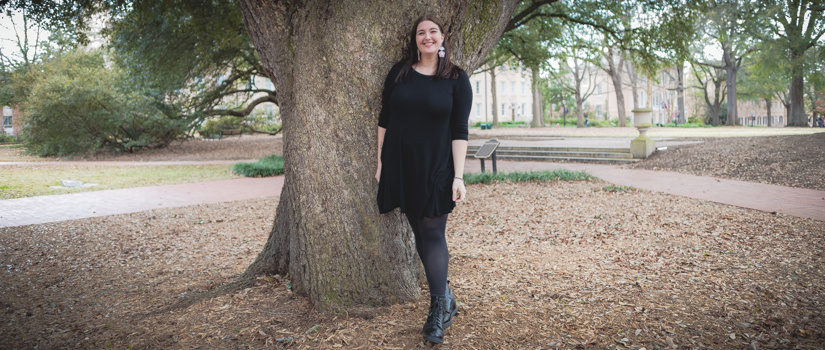April 7, 2020
Chris Woodley • cwoodley@mailbox.sc.edu
Author J.K. Rowling said, “Rock bottom became the foundation on which I rebuilt my life.” People who face adversity sometimes reach a point where they feel that life could not worse. But this can be when the comeback begins. MSW Advanced Standing student Laura Browning hit her bottom point as an undergraduate student at South Carolina. But it was a blessing in disguise and a turning point in her personal and educational life.
“If I hadn't 'blown up my life' for a minute, I don’t know if I would have improved,” Browning says. “I don't want to think about how hard my life would be now without the treatment I received. But I have the support, and happy that my life is completely different now.”
Browning was preparing to begin the fall semester of her junior year as a new social work major. That summer, she had found her true passion in her first social work class, policy for children and family. A former English/psychology double major, social work spoke to Browning’s desire to examine the holistic factors of someone’s life, such as why people act in a certain behavior.
But then some previously undiagnosed mental health issues delayed Browning’s educational pursuits. The combination of her persistent depressive disorder, generalized anxiety disorder, bad experiences from her family upbringing, and relationship difficulties were pilling on simultaneously. Browning had hit the bottom in her mental health and even though it was one of the worst periods in her life, she knew she needed a break and treatment to begin the road to recovery.
“I needed to stop and take a break from everything. Hitting the bottom was really hard, but I came out okay on the other side,” Browning says. “I knew this was the right thing to do, even though I was scared to leave school because I had never taken a break. But it turned out much better than staying in school, which would have put me in a bad place right now.”
Browning was diagnosed with one of the more stigmatized mental illnesses which can be difficult for others to understand. While she admits it’s hard to manage on her own at times, she has been in treatment for two years and continues to do well. A significant part of Browning’s support system before her treatment were the College of Social Work’s faculty and staff. Everyone supported her decision and knew that self-care and good mental health would be essential to completing her education.
“I remember when my mom and I met with Jennifer McArdle in the Field Education Office and she said, ‘Please do what's best for you. Please take care of yourself, and we will be right here to take you back when you're ready,'” Browning says. “She and everyone else at the college told me not worry about my schoolwork since I had more important things happening and that I needed to take care of myself. The common theme was, ‘Please don’t worry about this… it’s okay… come back when you’re ready.’”
Browning’s time off between her junior and senior years not only improved her mental health, it also helped her better understand self-care, which she had previously only learned about in the classroom.
“I didn't understand self-care or have a concept of when it’s okay to walk away or take a break. But I'm grateful to know what it means now,” Browning says. “I think it takes a personal experience or something difficult when you have to take care of yourself to drive home the meaning of self-care.”
Browning returned to the college revitalized and a stronger person mentally and physically. She completed her final two years and graduated with her Bachelor of Social Work last May as the cohort valedictorian. She also took her time away from school to decide to stay at the College of Social Work after earning her undergraduate degree.
“During my year off, I knew that I wanted to be in the MSW program. I was applying and figuring things out, and it was something I knew I wanted to do immediately,” Browning says. “I had established myself in Columbia and respected and maintained good relationships with the faculty. Since I felt at home with the program and knew I was already succeeding and enjoyed the education I was receiving, I knew that I wanted to stay here.”
Browning’s MSW studies have also allowed her to pursue her passion of working with children. In her field placement this academic year at Able SC, she worked with high school youth with disabilities in one-on-one settings to teach self-advocacy, career readiness and how to speak up for themselves to prepare them for living independently. She serves as an advocate for children with disabilities and ensures they access all their rights.
“High school kids are fun and have a lot of energy,” Browning says. “It can be a challenge sometimes working with kids who don’t want to participate but getting them involved and engaged is a pleasure and a huge win. If you can crack into something, even if it’s minor, then kids will say anything to you.”
Perhaps more than anyone, Browning’s personal experiences and social work education have been the perfect combination to prepare her for her professional goal of working with children who have experienced traumatic experiences.
“I want to practice trauma-informed care with children who have experienced abuse, maltreatment and neglect,” Browning says. “Specifically, those children who had a hard time in their own families and dealt with emotional abuse. It can affect how the brain is formed and stay with someone throughout their life.
As much as I loved psychology, it didn't look at all the external factors that affects a person. It didn't account for factors such as how family trauma and abuse effects someone's well-being. But social work is the entryway into everything, and I’ve discovered how the profession has more implications and possibilities.”
